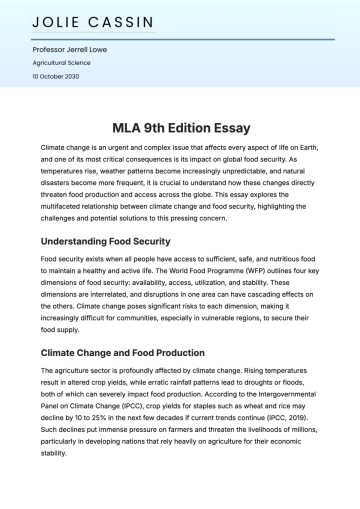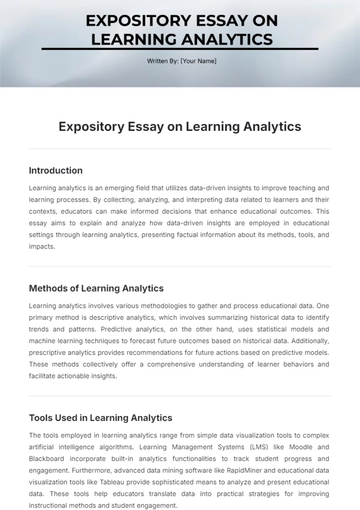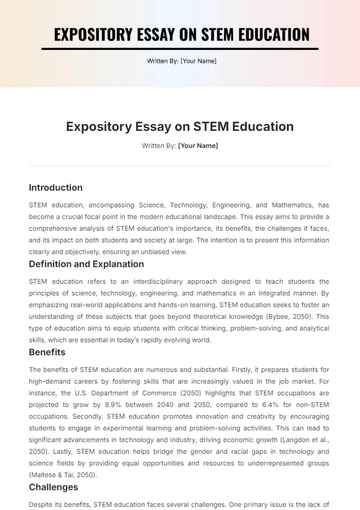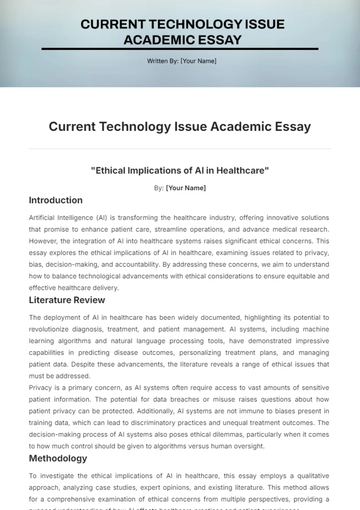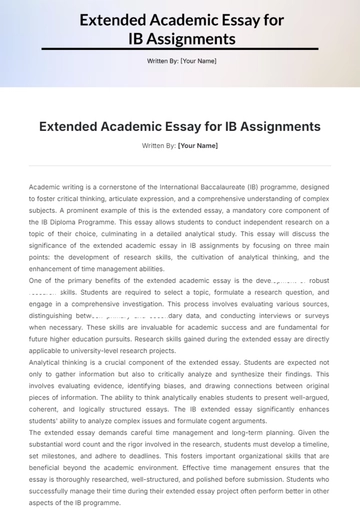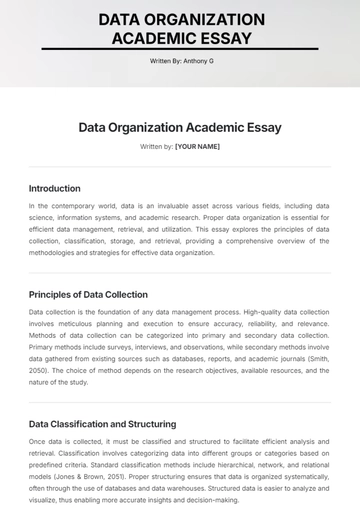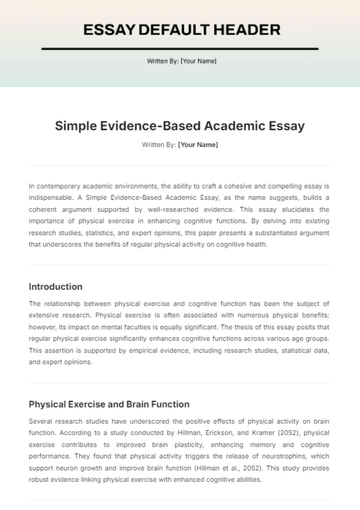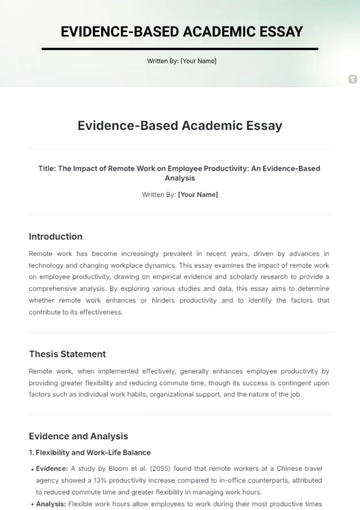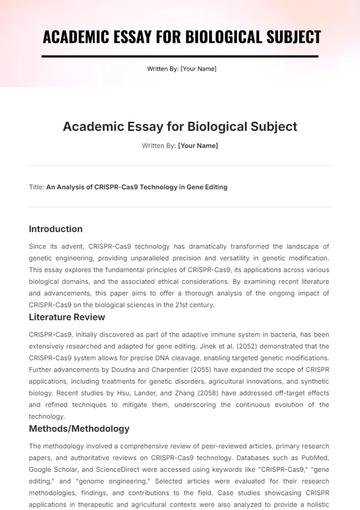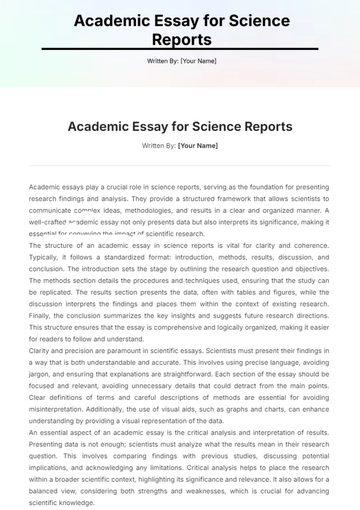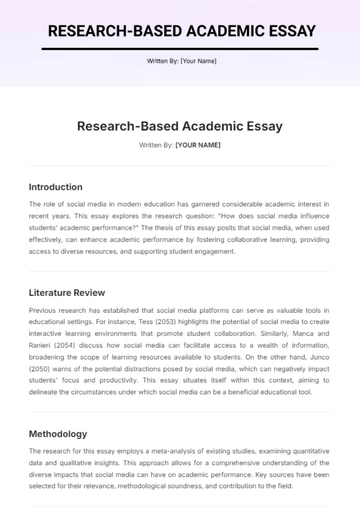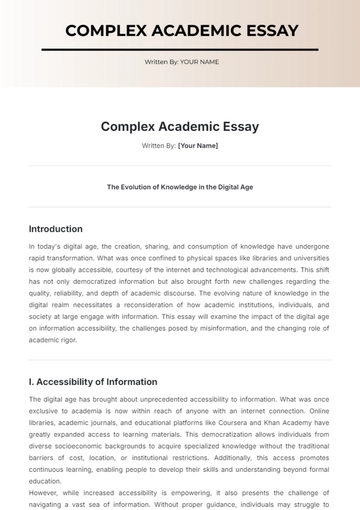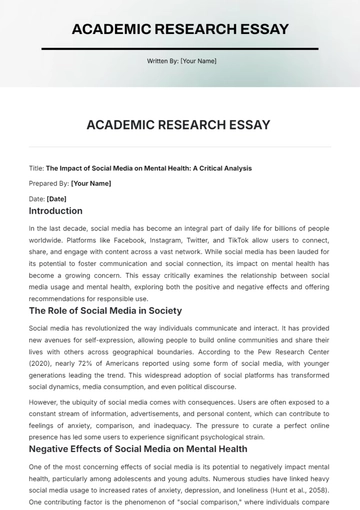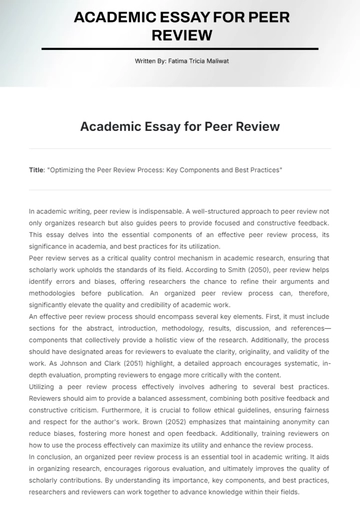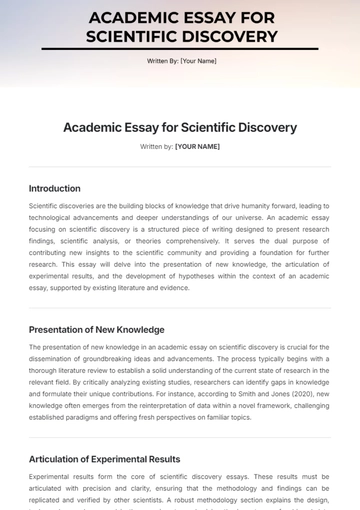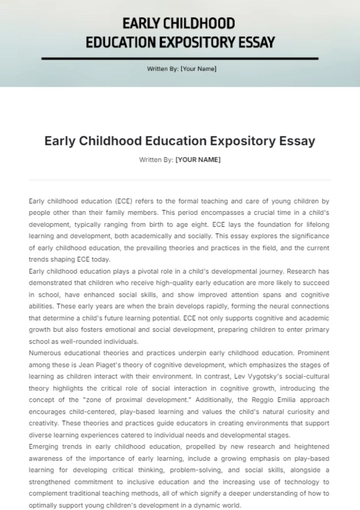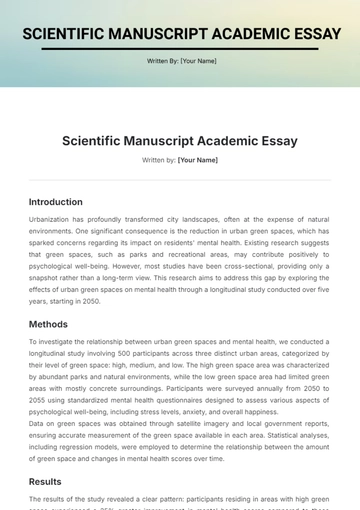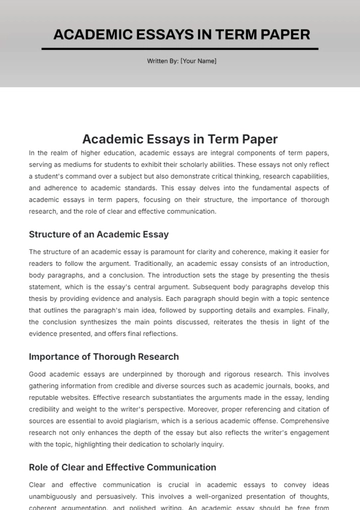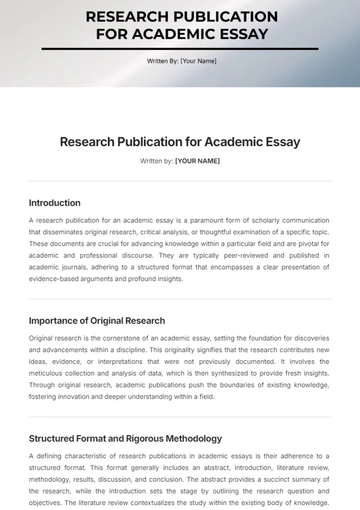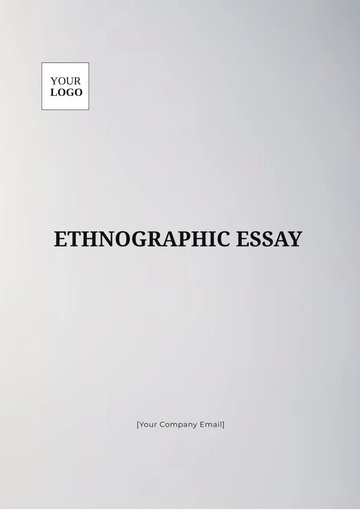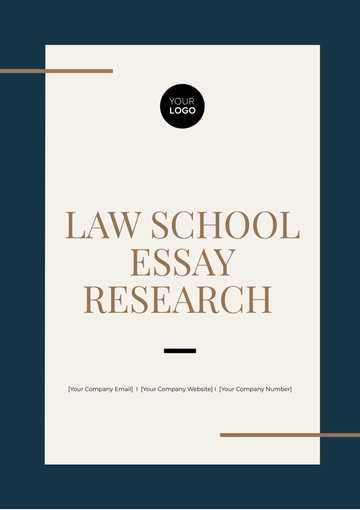Free Complex Academic Essay
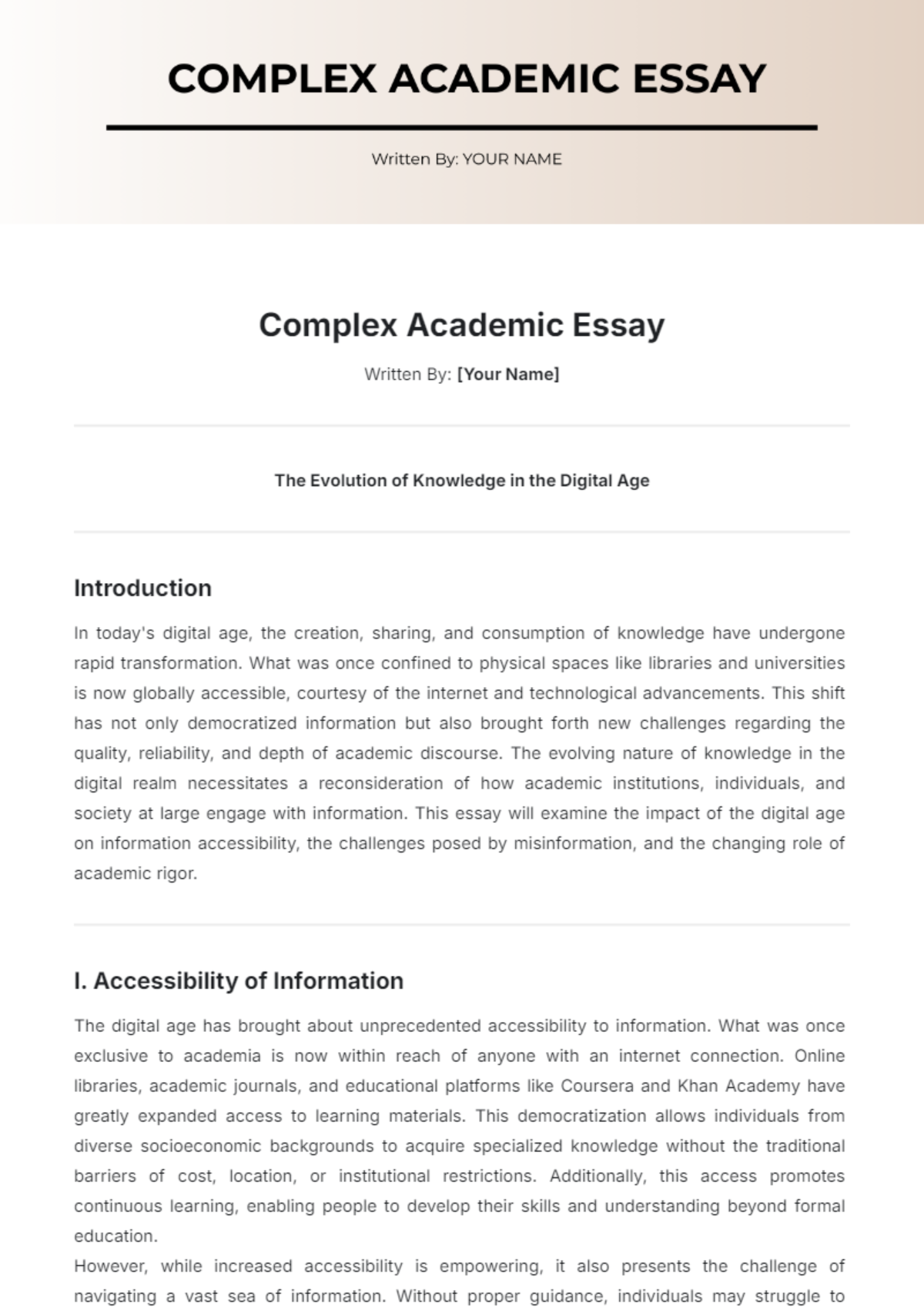
Written By: [Your Name]
The Evolution of Knowledge in the Digital Age
Introduction
In today's digital age, the creation, sharing, and consumption of knowledge have undergone rapid transformation. What was once confined to physical spaces like libraries and universities is now globally accessible, courtesy of the internet and technological advancements. This shift has not only democratized information but also brought forth new challenges regarding the quality, reliability, and depth of academic discourse. The evolving nature of knowledge in the digital realm necessitates a reconsideration of how academic institutions, individuals, and society at large engage with information. This essay will examine the impact of the digital age on information accessibility, the challenges posed by misinformation, and the changing role of academic rigor.
I. Accessibility of Information
The digital age has brought about unprecedented accessibility to information. What was once exclusive to academia is now within reach of anyone with an internet connection. Online libraries, academic journals, and educational platforms like Coursera and Khan Academy have greatly expanded access to learning materials. This democratization allows individuals from diverse socioeconomic backgrounds to acquire specialized knowledge without the traditional barriers of cost, location, or institutional restrictions. Additionally, this access promotes continuous learning, enabling people to develop their skills and understanding beyond formal education.
However, while increased accessibility is empowering, it also presents the challenge of navigating a vast sea of information. Without proper guidance, individuals may struggle to discern between credible sources and unreliable ones. Despite this challenge, the potential for global knowledge-sharing in the digital era stands as one of its most significant benefits, fundamentally reshaping the landscape of education and research.
II. The Rise of Misinformation
As knowledge becomes more accessible, the rise of misinformation poses a serious threat. The speed at which information travels across social media platforms and websites often allow false or misleading data to spread faster than it can be corrected. The open nature of platforms like Wikipedia or user-generated content websites further complicates the process of verifying factual accuracy. The viral spread of misinformation has consequences not only for public discourse but also for academic rigor, as students and researchers must carefully navigate an increasingly complex and crowded information space.
Academia has responded by emphasizing the importance of critical thinking and digital literacy. These skills are necessary for students to evaluate sources, assess credibility, and differentiate between legitimate scholarly work and pseudoscience or opinion masquerading as fact. The responsibility to counter misinformation now lies with both educational institutions and individual learners, as they must equip themselves with the tools to analyze and validate the vast array of information at their disposal.
III. The Evolving Role of Academic Rigor
In the face of this new information landscape, academic rigor has become more crucial than ever. The traditional pillars of academia—thorough research, peer review, and scholarly debate—must adapt to the rapid flow of information in the digital age. However, these pillars remain essential in ensuring the reliability and depth of knowledge produced. The emphasis on academic rigor requires a balance between embracing the benefits of digital platforms and upholding the meticulous standards of scholarship.
Furthermore, digital tools such as data analytics, artificial intelligence, and collaborative online platforms are increasingly being integrated into research practices, enhancing both the scope and precision of academic work. Scholars can now conduct more expansive research, collaborate globally in real-time, and apply digital methodologies to analyze large datasets. As a result, the definition of academic rigor is expanding to include these new technologies, demonstrating that the digital age can complement, rather than compromise, the integrity of scholarly work.
Conclusion
The digital age has ushered in a profound shift in how knowledge is created, shared, and consumed. While increased accessibility offers vast potential for global education and the democratization of information, it also presents challenges, particularly in combating misinformation and ensuring academic rigor. As individuals and institutions adapt to these changes, the role of critical thinking and digital literacy becomes indispensable. The evolution of knowledge in the digital age requires a delicate balance between embracing new technologies and maintaining the integrity of academic discourse, ensuring that the pursuit of knowledge remains both accessible and reliable.
- 100% Customizable, free editor
- Access 1 Million+ Templates, photo’s & graphics
- Download or share as a template
- Click and replace photos, graphics, text, backgrounds
- Resize, crop, AI write & more
- Access advanced editor
Simplify intricate topics with Template.net’s Complex Academic Essay Template. This editable and customizable template provides a clear structure for handling complex academic writing. Editable in our AI Editor Tool, it’s ideal for students and scholars tackling challenging subjects. Tailor the template to fit your essay’s needs, ensuring a well-organized, articulate presentation of complex ideas.
